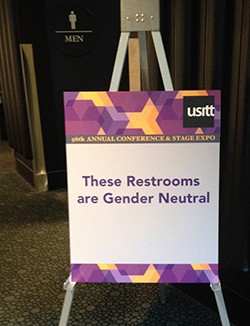News From David Grindle, USITT Executive Director
Taking a Stand for Our Members
 In April, President Shanda and I released a statement that the Institute would not be organizing events in North Carolina and Mississippi due to their passage of legislation that was deemed contrary to our statement on Diversity, Equity, and Inclusion passed by the Board of Directors. We have received much praise for this statement, which has been viewed on our website, via social media, and in the press. I’ve been asked a variety of questions by our membership. No one questioned the statement or its reasoning. However, I was intrigued by two specific questions: “Why now?” and “What laws or actions merit a statement from our organization?”
In April, President Shanda and I released a statement that the Institute would not be organizing events in North Carolina and Mississippi due to their passage of legislation that was deemed contrary to our statement on Diversity, Equity, and Inclusion passed by the Board of Directors. We have received much praise for this statement, which has been viewed on our website, via social media, and in the press. I’ve been asked a variety of questions by our membership. No one questioned the statement or its reasoning. However, I was intrigued by two specific questions: “Why now?” and “What laws or actions merit a statement from our organization?”
These two questions weren’t asked to be critical. They were asked to be informative, and as your Executive Director, I think they are great questions that deserve an answer.
Why now? What made the passage of these laws the tipping point?
The laws as passed impede the equitable treatment for all that is called for in our Diversity Statement. They do so when they remove legal recourse for people who have experienced discrimination. While some people may see value in these laws, the absence of legal redress in the face of discrimination puts all of our members at risk and results in a situation that we cannot ignore.
Discrimination is a daily fact of life. We judge people by their looks, body type, and mannerisms, and all of us are guilty of this. There are reasons we do it; sometimes it’s because our animal instinct says “I’m unsafe” and sometimes our prejudice says “I don’t like them.” When those triggers occur in our heads, we might cross the street or not get into an elevator. Whether or not those actions are right or wrong is not for debate in this venue. However, these laws allow us to go beyond that in society. These laws enable value judgements on people that may or may not be rooted in fact and that support denial of employment or services regardless of the capabilities of that person or the purpose of the business. That is discrimination, and until these laws were passed, there was legal recourse for people in these states to address these situations.
Why didn’t we issue a statement a year ago when Indiana passed a law that was seen in a similar vein? The law in Indiana did not prevent municipalities from passing protections against discrimination that were stronger than state law. These laws in North Carolina and Mississippi do exactly that. As a result, city and town governments that disagree with the state legislature cannot create protections for people. This contrasts with what happened in Indianapolis, where protections were in place prior to the law’s passage, and the new state law did not strip those protections.
The laws as passed have opened season on denying services to people from every direction with no legal recourse for anyone at the state level -- and we can’t risk that with the people we serve. That is where the line is drawn on whether or not USITT issues a statement about matters in various states. Much media attention has been focused on the “privilege to pee” aspect of these laws (to steal a moment from Urinetown), and while that flies in the face of our Diversity Statement, it is also a reasonably unenforceable clause unless we all have to travel with our birth certificates in North Carolina, which I don’t see happening. But these laws go much further than any attempted legislation to date.
We as an organization represent diversity as defined in a myriad of ways. This includes political diversity. Many times I have said that we should not pigeonhole arts people to the left leaning side of politics. We have a very wide range of individuals in our Institute, both conservative and liberal, and likely every stripe in between. That diversity is evident in the statement we released as we call upon our members to make their views known to their elected officials. We the Institute stand behind their exercising that freedom, even if their personal opinions don’t align with those held by other members.
The situation is as complex and diverse as our organization. But what is clear is the statement on Diversity that our Board of Directors passed in 2014. That is the directive that I must work from as the Executive Director and that the board has repeatedly endorsed. When actions or rules go against that statement, we must speak. And that is why we did.

